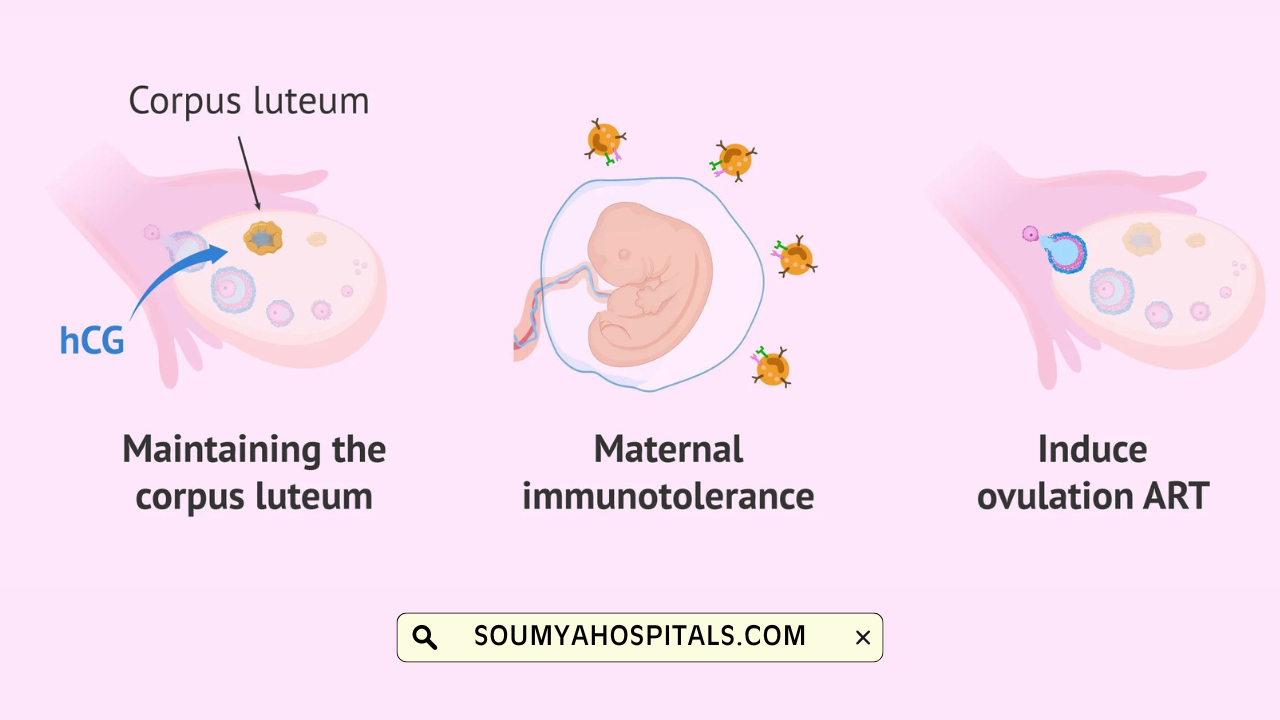Important Tests during pregnancy help assess the baby's growth & health along with the mother's well-being.
Human Chorionic Gonadotropin (hCG): Did you know that one key hormone plays a crucial role in pregnancy? Want to know more about it? Stay connected, as we are with an ultimate guide on Human Chorionic Gonadotropin (hCG) hormone.
Let's uncover everything about the hCG Human Chorionic Gonadotropin right from what it means to why monitoring your hCG levels is vital for a healthy pregnancy. You can even explore information about hCG that confidently navigates this exciting journey, from confirming your pregnancy to understanding the significance of your hCG numbers.
Whether you're trying to conceive or are already pregnant, get the lowdown on hCG human chorionic gonadotropin function, how it's measured, and what those levels mean from this informative article by Soumya Hospitals.
- What Is Human Chorionic Gonadotropin & HCG Levels?
- What You Need to Know About Your hCG Levels?
- What Are Normal hCG Levels by Week of Pregnancy?
- Early Pregnancy hCG Levels Chart
- Ectopic Pregnancy HCG Hormone Levels Chart
- How Do You Test HCG Hormone Levels In Pregnancy?
- Intrusive Causes Regarding False Report of hCG Test
- Can you still be pregnant with low hCG levels?
- FAQs on Human Chorionic Gonadotropin Hormone
What Is Human Chorionic Gonadotropin & HCG Levels?
Human Chorionic Gonadotropin (hCG) is commonly known as pregnancy hormone. It is created by the cells formed in the placenta. hCG hormone feeds the egg once fertilized and becomes linked to the uterine wall.
HCG levels during pregnancy should be in the correct range and rise weekwise for a healthy pregnancy. The levels of hCG can be known by performing a blood test around 11 days after conception and via a urine test around 12-14 days after conception.
The hCG levels generally double every 72 hours and arrive at a peak in the first 8 to 11 weeks of pregnancy before declining and leveling off for the rest of the pregnancy.

What You Need to Know About Your hCG Levels?
It's significant to read & memorize the following information regarding hCG hormone levels during pregnancy:
- The hCG hormone measures in ‘milli-international units per milliliter (mIU/mL)’.
- A hormone level of less than 5 mIU/mL is considered negative for pregnancy, whereas above 25 mIU/mL is considered positive.
- If your level falls between 6 and 24 mIU/mL, it's a grey area. Also, suggest to retake the human chorionic gonadotropin test to confirm pregnancy.
- It's important to be careful when interpreting hCG numbers, as a normal pregnancy can have low levels and still result in a healthy baby.
- Ultrasound results after the 5th week of pregnancy & week 6 of pregnancy are more accurate than hCG numbers.
- As your pregnancy progresses and hCG levels get higher, the time it takes to double can increase to about every 96 hours.
- A transvaginal ultrasound can show a gestational sac once the hCG levels reach between 1,000 – 2,000 mIU/mL. However, ultrasound findings should not be used to diagnose until the hCG level reaches at least 2,000 mIU/mL.
- It's best to have multiple hCG tests done a couple of days apart to get a more accurate assessment of the pregnancy's health.
- It's unreliable to use hCG levels to date a pregnancy, as the numbers can vary widely.
What Are Normal hCG Levels by Week of Pregnancy?
Do you want to gain comprehensive knowledge on HCG Level Week Wise in pregnancy? You've landed correctly. Here is the hCG levels chart that ranges the week-wise levels.
| Weeks since the last menstrual period | hCG levels (mIU/mL) |
| 3 | 5 - 50 |
| 4 | 5 - 426 |
| 5 | 18 - 7,340 |
| 6 | 1,080 - 56,500 |
| 7 to 8 | 7,650 - 229,000 |
| 9 to 12 | 25,700 - 288,000 |
| 13 to 16 | 13,300 - 254,000 |
| 17 to 24 | 4,060 - 165,400 |
| 24 to 40 | 3,640 - 117,000 |
However, it's important to note that a stand-alone hCG level cannot definitively diagnose a pregnancy abnormality. It's best to ignore overanalyzing a single hCG value. Also, note that healthy pregnancies can own lower than average hCG levels.
There is no worry as long as your healthcare provider confirms that your pregnancy is progressing normally. For further assistance with your concerns, you can even discuss them with your doctor.

Early Pregnancy hCG Levels Chart
Here is the free downloadable Early Pregnancy Human Chorionic Gonadotropin (hCG) Hormone Levels Chart to access & share everywhere:

Ectopic Pregnancy HCG Hormone Levels Chart

How Do You Test HCG Hormone Levels In Pregnancy?
There are two common types of hCG tests via blood test:
- A qualitative test that detects if hCG is present in the blood. It shows the hCG levels but not the specific amount.
- A quantitative test (or beta hCG test) that estimates the current amount of hCG levels in the blood.
One more way to test the hCG levels is a Urine test. At the time of the home pregnancy test, if the hCG is detected in the urine, it results positive. The urine test results can vary from home to lab as it is linked to many factors. When your hCG levels are higher then only at-home urine test results as positive.
So, visit your doctor or any healthcare provider to test your hCG hormone levels and get a clear picture of your pregnancy journey.
Intrusive Causes Regarding False Report of hCG Test
It's important to know that hCG serum or urine tests can sometimes generate inaccurate results. The false positive results can lead to unnecessary medical treatments or even irreversible surgical procedures. On the flip side, false negative results cause delays in receiving proper care or diagnostic evaluation.
There are various potential factors for these hCG test false results, which we'll briefly discuss:
Urine False Positives
- Ectopic production of hCG
- Blood or protein in the urine
- Exogenous hCG
- Human error in result interpretation
- Drugs (aspirin, carbamazepine, methadone, high urinary pH, and seminal fluid)
Urine False Negatives
- Early measurement after conception
- Hook effect
- Dilute urine specimen
Serum False Positives (1/1000 to 1/10,000)
- Ectopic production of hCG
- Chronic renal failure or ESRD on hemodialysis
- Heterophile antibodies
- Rheumatoid factors
- Exogenous hCG preparations for weight loss, assisted reproduction, doping
- IgA deficiency
- Red blood cell or plasma transfusion of blood with hCG in it has been reported
Serum False Negatives
- Early measurement after conception
- Hook effect
Can you still be pregnant with low hCG levels?
Yes, when there is a progression in hcg values by week during your pregnancy journey then it remains pregnant. As per the studies, every women's HCG Levels are distinct so keep working on your health and make your levels count trending upward from week to week.
In contrast, if a pregnancy hCG hormone test gives lower levels than expected, it might not necessarily indicate a problem. However, if the levels consistently decrease or stay the same during the early stage of pregnancy, that means pregnancy may not be viable.

FAQs on Human Chorionic Gonadotropin (hCG) Hormone
1. What is the beta hcg test range for pregnancy?
The beta hCG test detects the beta human chorionic gonadotropin hormone levels in your blood. The normal range of beta hCG depends on whether you're pregnant and how far along you are:
- Non-pregnant: Less than 5 IU/L
- Early pregnancy: Levels can double every few days, peaking around 10 weeks.
2. What is a good hCG level to confirm pregnancy?
25 mIU/mL is a good hCG hormone level to confirm pregnancy.
3. How much HCG is normal?
The normal levels of HCG in premenopausal women and men range from 0.02 to 0.8 IU/L. The normal range of HCG levels during pregnancy is 20,000 to 200,000 IU/L.
4. How to increase hCG levels by week?
There is no possible way to increase the hCG levels during pregnancy as the body produces and controls the hormone.
5. What do low hCG levels mean?
The low hcg levels mean various things such as Ectopic pregnancy, miscarriage, miscalculation of the last menstrual period, blighted ovum, etc.
6. What is meant by high levels of hCG?
High HCG levels mean Abnormal growths on your uterus, molar pregnancy, miscalculation of the last menstrual period, carrying multiples (twins, triplets, or more), etc.
7. What is the role of human gonadotropin hormone?
human gonadotropin hormone function is to thicken the lining of the uterus to support the growth of an embryo and signal the body to stop the monthly menstrual cycle.
8. Does gonadotropin levels increase during pregnancy?
Yes, gonadotropin levels in pregnancy rise rapidly around 10 weeks of gestation (first trimester). In the coming weeks of pregnancy, the levels of HCG Hormone come down.
Summary
Did you understand what hCG levels are during pregnancy? If yes, this comprehensive resource is your go-to for achieving a healthy pregnancy. Bookmark this Human Chorionic Gonadotropin (hCG) page and stay informed—because every detail matters when it comes to your baby's well-being!
Do Refer What Tests Are Done In Early Pregnancy Phase:
